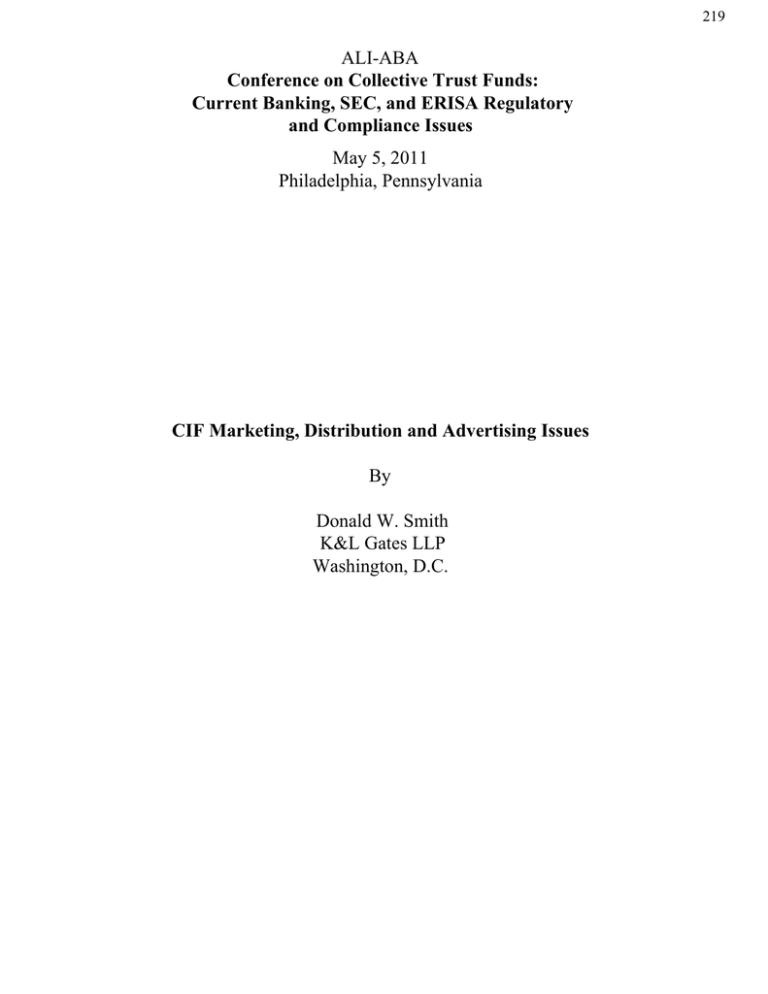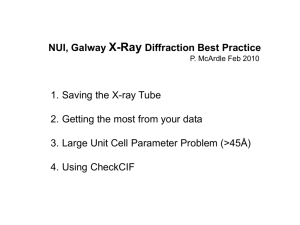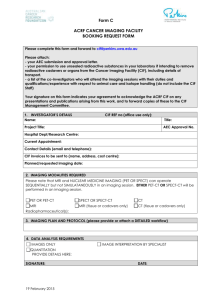ALI-ABA May 5, 2011 Philadelphia, Pennsylvania Conference on Collective Trust Funds:
advertisement

219 ALI-ABA Conference on Collective Trust Funds: Current Banking, SEC, and ERISA Regulatory and Compliance Issues May 5, 2011 Philadelphia, Pennsylvania CIF Marketing, Distribution and Advertising Issues By Donald W. Smith K&L Gates LLP Washington, D.C. 220 2 221 CIF Marketing, Distribution and Advertising Issues Donald W. Smith Partner K&L Gates LLP Marketing of CIFs* is subject to overlapping regulatory requirements including those administered by: Federal and state bank regulatory agencies, most importantly the Office of the Comptroller of the Currency (OCC) The Securities and Exchange Commission (SEC) and the Financial Industry Regulatory Authority (FINRA) The U.S. Department of Labor (DOL) Prospectively, the Municipal Securities Rulemaking Board (MSRB) * For the purposes of this presentation, a “CIF” is a bank collective fund exempt under Section 3(c)(11) of the Investment Company Act. 2 1 222 Most state bank regulators as well as the Federal Deposit Insurance Corporation look to the OCC for primary guidance regarding operation of CIFs. In the area of marketing and advertising, the OCC has emphasized in particular that banks should not: Provide projections of future CIF performance Provide unsubstantiated or misleading historical performance data Suggest that the bank will guarantee or ensure a CIF’s performance or safety 3 If third party advisers or others market a CIF, the OCC has recently stressed that: There should be prominent disclosure to investors in all marketing materials that the CIF is offered and maintained by the bank trustee and not by the third party The third party should be contractually obligated to make this disclosure The contract with the third party marketer should clearly delineate responsibilities for accepting new investors in the CIF For additional guidance, the OCC generally refers banks to certain positions of the SEC and FINRA in light of the fact that offering and sales of CIF interests are subject to the antifraud provisions of the federal securities laws. 4 2 223 Offerings of CIF interest are exempt from registration under the federal securities laws, and they are not subject to the offering restrictions applicable to private offerings of securities generally or the Investment Company Act Section 3(c)(3) restrictions on the advertisement and offering of common trust funds. The SEC staff has issued little specific guidance with regard to the manner of marketing interests in CIFs The SEC staff has not objected to suggestions that CIFs can be marketed in mailings, professional publications and other media that are reasonably designed to reach sponsors of, and other investment decision makers for, plans that are eligible to invest in CIFs CIF sponsors typically avoid marketing through mass media without a nexus to the plan investor community 5 The securities laws and SEC staff interpretations have a much more direct potential impact on the content of advertising and informational materials related to CIFs. Section 17 of the Securities Act and Rule 10b-5 under the Securities Exchange Act both prohibit sales of securities, including interests in CIFs, through false or misleading statements, omissions of material facts or through other fraudulent acts. Both of these antifraud provisions may be used by the SEC for enforcement actions Section10(b) can serve as the basis for private claims as well In 2010, the SEC brought a high profile enforcement case under Section 17 against a bank, in part premised on allegations of misleading statements in marketing and informational materials provided to CIF investors 6 3 224 Depending on the characteristics of the CIF, there may be additional grounds for regulation of marketing materials by the SEC and other agencies. If a registered investment adviser is involved in managing or marketing the CIF, the SEC staff can assert that marketing and informational materials conform to regulations and interpretations under the Investment Advisers Act If the CIF is marketed by a registered broker-dealer, marketing materials may be subject to FINRA requirements The DOL is in the process of completing detailed regulations regarding disclosures about investment products offered to sponsors of and participants in plans subject to ERISA (discussed below) As regulation of “municipal advisors” by the SEC and MSRB develops, new disclosure requirements may be imposed with regard to marketing to state and municipal plans 7 Increased regulatory attention to CIFs and concern over civil liability appear to be driving changes in the character of marketing and other disclosure materials. More attention to risk disclosure Increased standardization and controls on performance and other CIF disclosure Regular review and updating of CIF disclosure Conforming disclosure to that for similar strategies used by registered investment companies There is still some leeway for more concise disclosure due to the presumed investment sophistication of plan sponsors and advisers who select the CIF as a plan investment option. 8 4 225 Attention must be paid to the appropriate supervision of persons engaged in the marketing effort. In particular, the bank should maintain oversight of both its own employees and those of third parties who market the CIF. Bank employees and those of registered investment advisers that advise the CIF do not have to be registered representatives of a broker Persons who are registered representatives of a broker will be subject to supervision by the broker under applicable FINRA rules This may be the case even if they market the CIF in the capacity of dual employees of the broker and the bank or investment adviser Any person, other than an employee of a registered investment adviser, who markets the CIF to a state or municipal plan may need to be registered with the SEC and the MSRB as a registered municipal advisor under rules recently proposed by the SEC 9 The maintenance of web sites by trust companies and their advisers present a number of issues for marketing CIFs. Past practice suggests that some effort should be made to obtain representations that persons with access to marketing information are “qualified” plan representatives Disclaimers and click through agreements can be utilized Consideration may be given to further limiting access for plan participants Care should be taken to clearly identify the role of the bank responsible for the CIF and to not present the fund as a product of any third party adviser 10 5 226 2






